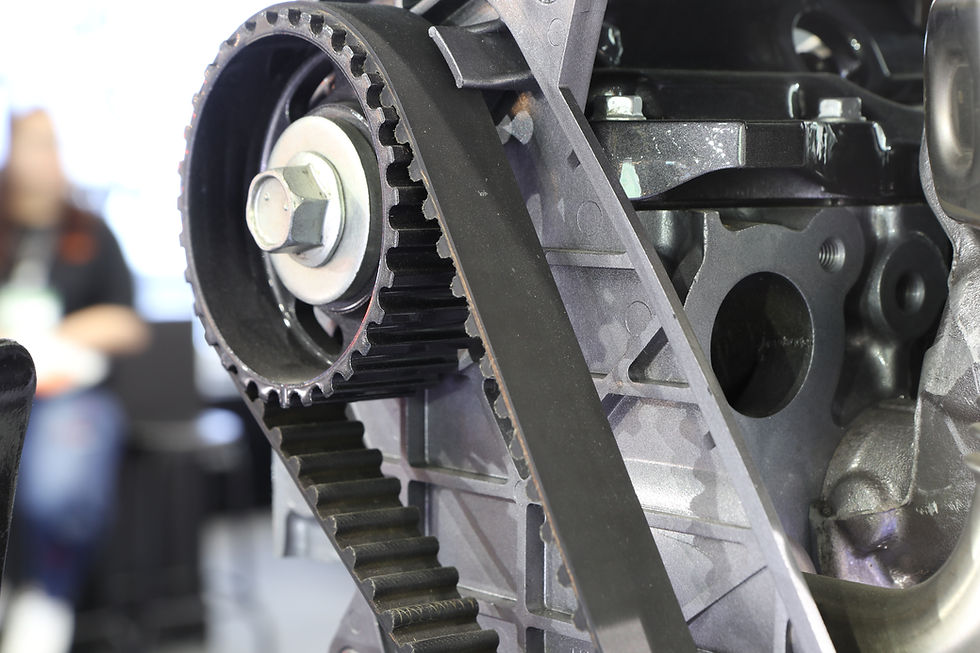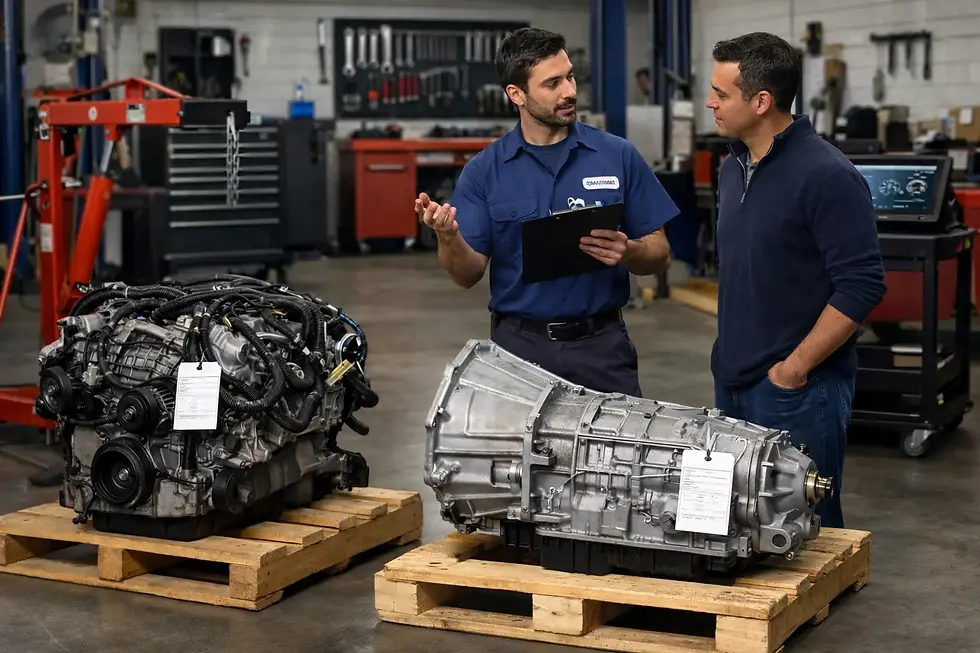Timing Belt vs. Timing Chain: What's the Difference & Which Is Better?
- austin schenacky
- Aug 6, 2025
- 3 min read
When it comes to engine reliability and performance, the timing system plays a important role. Whether you're shopping for a used engine or maintaining your current one, understanding whether your car uses a timing belt or a timing chain can help you avoid costly repairs and extend your engine’s life.
At Blue Prism Automotive, we’re not only engine sourcing specialists we’re also here to help you make informed choices that save you time and money.
What Is a Timing Belt?
A timing belt is a rubber belt with reinforced internal cords (typically fiberglass or Kevlar). It connects the crankshaft and camshaft, keeping your engine's valves opening and closing in perfect sync with piston movement.
Pros: Quiet operation, lighter, cheaper to manufacture
Cons: Requires scheduled replacements (~60,000–100,000 miles), susceptible to heat and wear
What Is a Timing Chain?
A timing chain serves the same purpose but it's made of metal and designed to last much longer. Unlike belts, chains are housed inside the engine and run in oil for lubrication.
Pros: Durable, often lasts the lifetime of the engine (~150,000+ miles)
Cons: Noisier when worn, higher replacement cost, tensioner failure can cause serious issues

timimg belt
Timing Belt vs. Timing Chain: Side-by-Side Comparison
Feature | Timing Belt | Timing Chain |
Material | Rubber with Kevlar/Fiberglass | Steel links |
Lifespan | 60,000–100,000 miles | 150,000+ miles (with good maintenance) |
Maintenance Need | Must be replaced on schedule | Occasional inspection required |
Cost to Replace | $400–$1,200 (parts + labor) | $1,000–$2,500+ (labor-intensive) |
Noise Level | Quiet | Louder as it wears |
Common Use | Small to mid-sized engines | Larger, high-performance, luxury engines |
How to Know What Your Car Has
Owner’s Manual: The best source. Check under maintenance or engine specs.
Ask a Mechanic: Many shops can tell you with a quick inspection.
Visual Clues: Timing belts are usually covered by a plastic housing; chains are internal and run in oil.
Real Case Insights (Reddit Highlights)
From r/MechanicAdvice:
“I skipped my 90k-mile timing belt change on my Subaru, and it snapped. Bent valves. $2,800 later I learned my lesson.” Source
From r/JustRolledIntoTheShop:
“Customer tried to DIY a chain replacement on their 3.5L Ford. Got timing marks wrong—engine toasted.👉 See Full Thread
These real-world examples show how critical timing system knowledge is especially when buying a replacement engine.
Timing Belt Replacement Cost
Vehicle Type | Typical Replacement Cost |
Compact Car | $400–$600 |
Mid-size Sedan | $600–$900 |
SUV/Truck | $800–$1,200 |
Note: These costs include parts and labor. Water pump replacement is often done simultaneously.
Timing Chain Replacement Cost
While chains rarely need replacement, when they do, costs can be higher:
Average Cost: $1,000–$2,500+
Why? Requires engine disassembly
Pro Tip: Maintain oil changes to preserve chain life
Engines That Use Timing Belts vs. Timing Chains
Engine Type | Timing Belt Engines | Timing Chain Engines |
Examples | Honda Civic (older), Subaru Outback | Toyota Camry (2.5L, 3.5L), BMW 3-Series |
Common Replacements | VW Jetta (1.8T), Audi A4 (pre-2005) | Ford F-150 (3.5L EcoBoost), GM LS series |
Need help finding a tested replacement? Visit our Used Engine Inventory for VIN-matched options.
Car Belt Replacement: Why Timing Matters
A failed timing belt can cause engine failure, especially in interference engines (where valves can collide with pistons). Regular belt servicing is cheaper than replacing the entire engine.
Blue Prism Automotive: How We Help
VIN-Matched, A-Grade Certified Engines
Pre-tested for Compression, Leak, and Mileage Integrity
Warranty Options up to 1 year
Nationwide LTL Shipping within 2–5 business days
Whether your vehicle runs a timing belt or chain, our Used Engine Experts are here to help you make a smart, budget-conscious replacement decision.
Final Thoughts: Timing Belt or Chain?
Both have their place neither is strictly better. Consider your driving style, vehicle type, and long-term maintenance goals.
Timing Belt: Ideal for drivers willing to follow maintenance intervals
Timing Chain: Best for long-term use with good oil habits
Need Help Choosing?
Submit your VIN via our Engine Quote Form or call us at (430) 413-4976—and let’s find the perfect replacement engine with the right timing setup for your car.




Comments